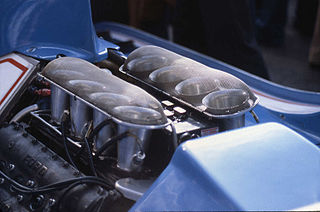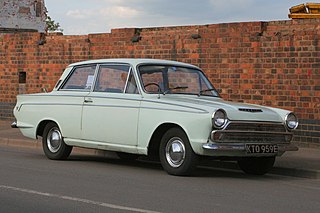
The Ford GT40 is a high-performance endurance racing car designed and built by the Ford Motor Company. It grew out of the "Ford GT" project, an effort to compete in European long-distance sports car races, against Ferrari, who had won the prestigious 24 Hours of Le Mans race from 1960 to 1965. Ford succeeded with the GT40, winning the 1966 through 1969 races.

Stock car racing is a form of automobile racing run on oval tracks and road courses measuring approximately 0.25 to 2.66 miles. It originally used production-model cars, hence the name "stock car", but is now run using cars specifically built for racing. It originated in the southern United States; its largest governing body is NASCAR. Its NASCAR Cup Series is the premier top-level series of professional stock car racing. Australia, Canada, New Zealand, Mexico, Brazil and the United Kingdom also have forms of stock car racing. Top-level races typically range between 200 and 600 miles in length.

A Locost is a home-built car inspired by the Lotus Seven. The car features a space frame chassis usually welded together from mild steel 1 in × 1 in square tubing. Front suspension is usually double wishbone with coil spring struts. The rear is traditionally live axle, but has many variants including independent rear suspension or De Dion tube. Body panels are usually fiberglass nose and wings and aluminium side panels. Each car is highly individualized according to the resources, needs and desires of each respective builder.

Cosworth is a British automotive engineering company founded in London in 1958, specialising in high-performance internal combustion engines, powertrain, and electronics for automobile racing (motorsport) and mainstream automotive industries. Cosworth is based in Northampton, England, with facilities in Cottenham, England, Silverstone, England, and Indianapolis, IN, US.

The Ford Cortina is a medium-sized family car manufactured and marketed initially by Ford of Britain, and then Ford of Europe in various body styles from 1962-1982 over five generations — and was the United Kingdom's best-selling car of the 1970s.

The Ford Sierra is a mid-size car or large family car manufactured and marketed by Ford Europe from 1982–1993, designed by Uwe Bahnsen, Robert Lutz and Patrick le Quément — and noted for its aerodynamic styling producing a drag coefficient of 0.34, a significant improvement over its predecessors.

The Ford Mondeo is a car manufactured by Ford since 1993. The first Ford model declared as a "world car", the Mondeo was intended to consolidate several Ford model lines worldwide. The Mondeo nameplate is derived from the Latin word mundus, meaning "world". For its first two generations, the Mondeo was produced using the CDW27 platform, with the third-generation model shifting to the EUCD platform. The fourth-generation models use the CD4 platform, and the fifth-generation use the C2 platform.

The Ford Scorpio is an executive car that was produced by Ford Germany from 1985 to 1998. It was the replacement for the European Ford Granada line. Like its predecessor, the Scorpio was targeted at the executive car market. A variant known as the Merkur Scorpio was sold briefly on the North American market during the late 1980s.

The Ford GT is a mid-engine two-seater sports car manufactured and marketed by American automobile manufacturer Ford for the 2005 model year in conjunction with the company's 2003 centenary. The second generation Ford GT became available for the 2017 model year.

The Ford Escort is a small family car that was manufactured by Ford of Europe from 1968 until 2000. In total there were six generations, spread across three basic platforms beginning with the original rear-wheel drive Mk.1/Mk.2 (1968–1980), the "Erika" front wheel drive Mk.3/Mk.4 (1980–1992), and the final CE-14 Mk.5/Mk.6 (1990–2002) version. Its successor - the Ford Focus - was released in 1998, but the final generation of Escort was gradually phased out, with the panel van version ending production in 2002 in favour of the Ford Transit Connect.

Ginetta Cars Limited is a British specialist builder of racing and sports cars based in Garforth, Leeds, West Yorkshire.
Dutton Cars, based in Worthing, Sussex, England, was a maker of kit cars between 1970 and 1989. In terms of number of kits produced, it was the largest kit-car manufacturer in the world.
Sylva Autokits is a kit car manufacturer based in Lincolnshire, England. Sylva was founded in 1981 by Jeremy Phillips and has developed and produced a number of small and lightweight sports cars. Sylva cars have won a number of 750 Motor Club Kit Car championships.

The Ford Falcon (BF) is a full-size car that was produced by Ford Australia from 2005 to 2008. It was the third and final iteration of the sixth generation of the Falcon. The station wagon body design continued until 2010, alongside the new seventh generation Falcon range.

The Ford Falcon (FG) is a full-sized car that was produced by Ford Australia from 2008 to 2014. It was the first iteration of the seventh and last generation of the Falcon. Its range no longer featured the Fairmont luxury badge, replaced instead by the G Series.

Marlin is a British sports car manufacturer founded in 1979 in Plymouth as Marlin Engineering and now located in Crediton, Devon, England.

The Ford P100 is a car-based pickup truck that was built by Ford from 1971 to 1995, initially in South Africa, and later Portugal. It was based on medium-sized Ford passenger cars, originally the Cortina/Taunus and from 1988 the Ford Sierra. Initially marketed as the Ford Cortina Pickup, the P100 name was adopted in 1982. The P-100 name had previously been used on a small North American panel van in the 1960s.

Haynes Roadster is a replica of a Lotus Seven home-built according to a book Build Your Own Sports Car: On a Budget by Chris Gibbs (ISBN 1-84425-391-0). A Ford Sierra is used in the car as a donor for drivetrain and suspension components.

Eagle Cars Limited was an English company, based in Lancing, West Sussex, originally operated by Allen Breeze, although it has undergone a number of ownership changes since. Originally making a Jeep lookalike called the RV, between 1981 and 1998 they built several iterations of a gull-winged car called the Eagle SS. The SS was based on an American kit car called the Cimbria, and was brought to the UK by Tim Dutton. In 1988 Eagle Cars moved inland, to nearby Storrington.

The Ford Mondeo I (first generation) is a mid-size car that was produced by Ford, beginning on 23 November 1992, with sales beginning on 22 March 1993. It is also known as the Mk I Mondeo; the 1996 facelift versions are usually designated Mk II. Available as a four-door saloon, a five-door hatchback, and a five-door estate, all models for the European market were produced at Ford's plant in the Belgian city of Genk. In December 1992, Autocar published a section on the Mondeo, and how it would conquer rivals.


















